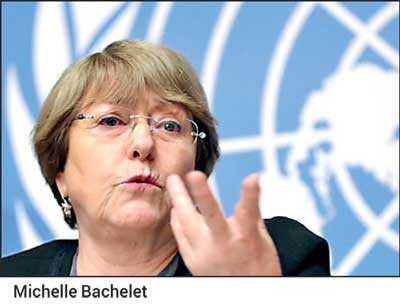Friday Feb 20, 2026
Friday Feb 20, 2026
Thursday, 21 March 2019 01:42 - - {{hitsCtrl.values.hits}}
GENEVA, AFP: The UN human rights chief yesterday warned Sri Lanka it could slip back to conflict unless it addressed the “worst crimes” during the final stages of its ethnic war. 
Michelle Bachelet told the Human Rights Council that Sri Lanka was yet to set up the special judicial mechanism as promised four years ago to try war criminals.
Sri Lankan Government troops have been accused of killing at least 40,000 ethnic Tamil civilians in the final months of the island’s 37-year guerrilla war that ended in May 2009.
Colombo had agreed to ensure an accountability mechanism by March, but Sri Lankan authorities have said they want another two years to deliver.
The Council is expected to decide on granting an extension, but Bachelet said Sri Lanka’s failure to address emblematic cases had led to a lack of confidence.
“Continuing impunity risks fuelling communal or interethnic violence, and instability,” she said. “Resolving these cases, and bringing the perpetrators of past crimes to justice, is necessary to restore the confidence of victims from all communities.” She noted a “lack of progress in setting up a special judicial mechanism to deal with the worst crimes committed during the 2009 conflict”.
Delays were partly due to a power struggle between President Maithripala Sirisena and his estranged Prime Minister Ranil Wickremesinghe late last year, she said.
Sirisena sacked the Government and called a snap election, but the Supreme Court restored the status quo after ruling that the President had violated the Constitution.
Sirisena and Wickremesinghe are also at odds over ensuring accountability.
Earlier this month, Sirisena said he wanted the Rights Council to drop the demand to prosecute war criminals, but later retracted and agreed to the Government’s call to buy more time.
“A contributing factor to delays appears to be a lack of common vision among the country’s highest leadership,” Bachelet said.
“Deadlock on these important issues is an additional – and avoidable – problem, with damaging impact currently on victims from all ethnic and religious groups and on society as a whole,” she said.
A UNHRC resolution in October 2015 granted Sri Lanka 18 months to establish a credible investigation. The two-year extension to that expires this month and there have been no tangible results.